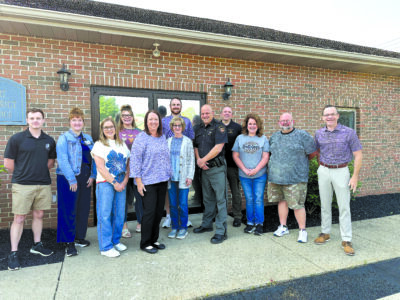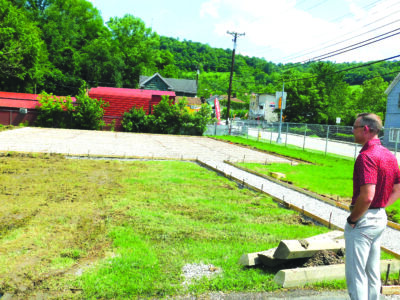Residents gathering weekly in wake of train disaster
EAST PALESTINE, Ohio — When a Norfolk Southern train hauling toxic chemicals derailed in East Palestine Feb. 3, local, state and federal agencies sprang into action.
Those responding agencies held what was the third open house since the disaster at East Palestine High School on Thursday to keep those impacted up to date on the cleanup efforts and environmental remediation.
For some, the weekly open house is an opportunity to be informed and, for others, a chance to be heard.
“I come every week just to keep abreast of changing information,” East Palestine Julie Adam said. “If you don’t come every week, you are going to lose what is actually going on. It’s a lot of homework and really you have to be and stay informed.”
Thursday’s open house/ resource fair was led by the Environmental Protection Agency. Representatives of both the state and regional EPA along with the Columbiana Health Department, Norfolk Southern and various social organizations were on hand to answer questions and speak with residents one-on-one. Information on air and water monitoring and soil sampling was provided and residents seeking health assessments or financial relief were advised what actions to take.
Those representatives, including Ohio EPA Director Anne Vogel, are becoming familiar faces to the residents like Adam who never miss an informational opportunity as the village and surrounding communities try to move forward.
“Even if there’s no new information, you still see the same people and ask questions,” Adam said. “I want to know what’s going on. The only way to know what’s going on is to be here.”
While Adam came to the open house to be educated on what is being done, the Felger family came to educate others on what they are going through. Nancy Felger’s house is located just a block from the derailment site. Nancy, the caretaker of her adult disabled daughter, Donna, does not feel safe returning to her home. She and Donna are currently staying with friends and spent the first few days after the disaster at the Salem home of her other daughter, Kelly. Eventually, Nancy said she will move back into her house, but not until she feels it safe to do so.
“I got a lot of bottled water at the house and I have a water filtration system today. And probably in the middle of next month, I am going to go back to the house,” she said. “I am going to have an air filtering system placed on my furnace and my furnace registers cleaned out. Sooner or later, I am going to get new carpet, new furniture and new beds.”
East Palestine is Nancy’s home. If she didn’t own her house or if she wasn’t concerned about how the derailment has impacted property values, she may have left or at least consider leaving. Right now, her plans are to stay.
“The house values took a dive. If I was renting, I’d probably be out of town, but I own my house and I’m going to clean it up as best I can,” she said. “I plan to have the outside cleaned and washed down. Kelly helped me wash down all the inside walls, but we will have to do that again.”
Kelly was upset that they would have to repeat the process and expressed anger that the railroad’s decision to lay the old tracks on contaminated soil slowed the cleanup and caused more work and worry for her mother. That decision has since been reversed. Norfolk Southern insists the railroad was only following remediation plans used before in situations similar to the derailment and that those plans were approved by the EPA. Kelly and many others saw it as the railroad’s attempt to get back to business as soon as possible after the disaster.
“I want to know why (Norfolk Southern) laid the rails on top of contaminated ground. All they did was lay those tracks so they could get their money. That’s all they care about,” Kelly said. “If they would have taken care of the situation in the first place, they wouldn’t have to spend more of their money and waste more of our time. We have to reclean everything again because they had to dig all that stuff back up. They weren’t worried about people. They were worried about money.”
Nancy worries about money, too. She doesn’t know if she will be reimbursed for the costs she has already shelled out to clean her house or the money she will spend on cleaning in the future. It hasn’t been cheap, but some things, she said, you can’t put a price on.
“I may have to run my credit card up a little bit more or take some out of my savings but I need to have more peace of mind,” she said.
Peace of mind has been hard to come by at times as Nancy deals with the anxiety the derailment has caused her.
“I’ve been pretty stressed out. I can usually deal with things pretty good, but some days I am a basket case. I will be driving down the road and start bawling,” she said. “I dealt with my husband in Vietnam. I dealt with my daughter going through chemo. I dealt with my husband going through chemo and radiation and dying. But this? This is just so stressful because of the unknown. I am just trying to do the best I can.”
Not knowing what health effects the exposure to the chemicals spilled during the derailment and the control burn at the site after it could have on the people of East Palestine worries Nancy the most. She is especially worried about Donna.
“She had leukemia when she was 5,” Nancy said. “That’s all I keep thinking about. I think about what all this could do to her.”
Adam, too, is concerned about the impacts the derailment has had and will have on the health of East Palestine. While her main objective at Thursday’s open house was to learn, she was also there to advocate for dioxin blood testing. She has attempted to have such a test performed on herself but said she discovered that no such test is available in the United States.
“I called the Cleveland Clinic and Cleveland Clinic said there is nothing in the U.S. They did identify someone in Canada who does it,” she said. “So it is possible. It’s expensive, but it can be done.”
Adam, a nurse by trade, insists that establishing a baseline of dioxins through bloodwork is the only way to accurately track the effects of any chemical exposure.
“Nobody knows at this stage what these chemicals will do or have done. You need to have a baseline,” she said. “I think the town would feel better, too, if they know they are getting a baseline. I learned that dioxins can be in and out of your bloodstream in three to six months of your exposure so we need testing now.”
Adam believes that Norfolk Southern should provide such a test for residents and was using Thursday’s open house as an opportunity to ask the railroad representatives to do just that.
“That’s why I’m here. I am here to ask questions,” she said. “We need that type of health monitoring set in place now and followed up with long-term testing in the future. That’s what I am asking for. That’s what we should all be asking for.”
selverd@mojo.news





